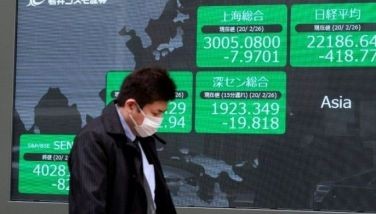Bangladesh marks May Day with demands for safety
SAVAR, Bangladesh — Thousands of workers paraded through central Dhaka on May Day to demand safety at work and the death penalty for the owner of a garment factory building that collapsed last week in the country's worst industrial disaster that killed at least 386 people and injured 2,500.
A raucous procession of workers on foot, pickup trucks and motorcycles wound its way through central Dhaka on Wednesday. They waved the national flag and banners, beat drums and chanted "direct action!" ''death penalty!" From a loudspeaker on the back of a truck, a participant spoke for the group: "My brother has died. My sister has died. Their blood will not be valueless."
May Day protests, customarily an opportunity for workers in this impoverished South Asian nation to vent their grievances, has taken on a poignant significance this year following the April 24 disaster when the illegally constructed 8-story Rana Plaza collapsed in this Dhaka suburb, bringing down with it five garment factories. It was the deadliest disaster to hit Bangladesh's garment industry, which is worth $20 billion annually and supplies global retailers, surpassing a fire in a clothes factory in November when 112 people were killed.
The owner of the building, Mohammed Sohel Rana, is being questioned by police while under arrest. He is expected to be charged with negligence, illegal construction and forcing workers to join work, which is punishable by a maximum of seven years in jail. Authorities have not said if he more serious crimes will be added.
To the workers, however, it was clear that the 38-year-old Rana, a small time politician of the ruling Awami League party, should get the capital punishment.
"I want the death penalty for the owner of the building. We want regular salaries, raises and absolutely we want better safety in our factories," said Mongidul Islam Rana, 18, who works in a garment factory that was not located in Rana Plaza
The Bangladesh High Court has ordered the government to confiscate Rana's property and to freeze the assets of the owners of the factories in Rana Plaza so that the money can be used to pay the salaries of their workers.
Rana had permission to build five stories but added three more floors illegally. When huge cracks appeared in the building a day before its collapse, he told tenants that it was perfectly safe and they should go back in. The next day, a bank and some shops refused to occupy the premises but factory managers told their workers to go back in. A couple of hours later the building came down in a heap of concrete and bricks.
Some 2,500 people escaped with injures and rescue workers have recovered 386 bodies but believe that many more are still buried on the ground level. One social activist group estimates that 1,000 people are still missing, indicating that the final death toll could be much higher.
The garment-factory fire in November brought widespread pledges to improve worker-safety standards in Bangladesh. But since then, very little has changed.
"I think it is a wakeup call for the nation, a wakeup call for the industry and for the trade unions," said Shirin Akter, founding president of Karmojibi Nari, a Dhaka-based Bangladeshi group that lobbies for the rights of women in the workplace.
Bangladesh's garment industry was the third-largest in the world in 2011, after China and Italy, having grown rapidly in the past decade.
Among the garment makers in the building were Phantom Apparels, Phantom Tac, Ether Tex, New Wave Style and New Wave Bottoms. Altogether, they produced several million shirts, pants and other garments a year.
The New Wave companies, according to their website, make clothing for several major North American and European retailers. Britain's Primark has acknowledged it was using a factory in Rana Plaza. It said in a statement Monday that it is providing emergency aid and will pay compensation to victims who worked for its supplier.
"Primark notes the fact that its supplier shared the building with those of other retailers. We are fully aware of our responsibility. We urge these other retailers to come forward and offer assistance," it said.
Canadian company Loblaw Inc., which also got its Joe Fresh clothing line made in Rana Plaza, said Monday it will ensure that victims and their families "receive benefits now and in the future."
Spokeswoman Julija Hunter said the company is still working out the details, but plans to deliver support "in the best and most meaningful way possible."
Many workers had complained after the factory fire in November that they did not receive compensation in time.
Wal-Mart said none of its clothing had been authorized to be made in the facility, but it is investigating whether there was any unauthorized production.
- Latest
- Trending




























